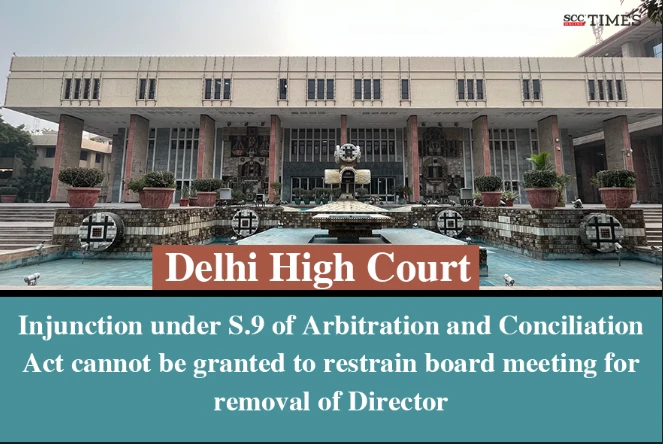Delhi High Court: The present appeal was filed under Section 37(1)(b) of the Arbitration and Conciliation Act, 1996 (‘the Act’) against the order dated 9-6-2025 (‘impugned order’), passed by the District Judge under Section 9 of the Act, wherein the Appellant company was restrained from convening board meeting dated 15-4-2025 and Extraordinary General Meeting (‘EGM’) dated 12-5-2025. he Single Judge Bench of Anil Kshetarpal, J., held that injunction under Section 9 of the Act cannot be granted with the purpose of restraining the Appellant company from convening a meeting concerning the proposed removal of the Respondent from the directorship of the Appellant company.
Background
The Respondent was one of the Directors of the Appellant company and was entrusted with responsibilities relating to growth, franchise development, marketing and day-to-day operations. The Respondent was abruptly denied access to official email systems, his salary was withheld, and he was served with short-notice communications convening board meetings, without being furnished with any particulars or reasons for the proposed deliberations, which ultimately included consideration of his removal from Directorship.
The Respondent had invoked the arbitration clauses contained in his Employment and Shareholders’ Agreement and had approached the Commercial Court under Section 9 of the Act, seeking interim relief restraining the Appellant company from proceeding with the board meeting.
The Respondent had contended before the District Judge that the proposed EGM was violative of Sections 169 and 173(3) of the Companies Act, 2013 (‘Companies Act’), since he was given neither an adequate notice nor a reasonable opportunity of being heard prior to the proposed removal. The Appellant company on the other hand had submitted before the District Judge that the urgent removal was necessitated due to serious financial irregularities, breach of fiduciary duties and acts of sabotage. Furthermore, the invocation of Section 9 of the Act by the Respondent was with the intent of obstructing the lawful functioning and governance of Appellant company.
The District Judge had granted interim protection to the Respondent by restraining the Appellant company from acting upon the agendas of the board meeting and EGM scheduled for 15-4-2025 and 12-5-2025, insofar as they pertained to the removal of the Respondent from the Board.
The issue for consideration before the Court was whether the interim injunction granted by the District Judge under Section 9 of the Act, restraining the Appellant company from acting on the agenda of proposed board meeting and EGM concerning removal of the Respondent as a director, was permissible.
Analysis, Law and Decision
The Court noted that while Section 169 of the Companies Act, guarantees a Director the right to a reasonable opportunity of being heard prior to removal, it also expressly permits board meetings to be convened at shorter notice, subject to the prescribed conditions. The legislative intent behind Section 173(3) of the Companies Act is to ensure that companies are not prevented from acting swiftly in matters of urgency, especially where the Articles of Association so permit.
In the instant case, the meetings sought to be convened were for the purpose of considering serious allegations pertaining to financial irregularities, breach of fiduciary duties, and obstruction of audit processes. The Court noted that these issues, by their very nature, warranted urgent deliberation by the board. In such circumstances, recourse to the proviso to Section 173(3) of the Companies Act, which permits shorter notice for the transaction of urgent business, cannot be held to be per se illegal or unjustified.
Moreover, the impugned order did not record any findings on the existence of a prima facie case, balance of convenience, or irreparable harm—principles that are fundamental to the grant of interim relief. Nor was there any observation suggesting that the Appellant acted in a mala fide or oppressive manner. On the contrary, the urgency cited by the Appellant, including concerns relating to obstruction of audit processes and financial mismanagement, constituted a legitimate basis for invoking the statutory exception under the proviso to Section 173(3) of the Companies Act. In such circumstances, the blanket restraint imposed on the convening meetings amounts to a pre-emptive adjudication of contested facts and results in an unwarranted freezing of the company’s governance functions.
Thus, the Court held that the injunction granted by the District Judge effectively curtailed the statutory right of the Appellant company to convene a board meeting and deliberate on serious governance issues, which was a matter squarely within the internal domain of corporate management and not amenable to injunctive interference.
The Court further held that the grant of injunctive relief by the District Judge was akin to final adjudication which was neither legally tenable nor supported by sufficient factual foundation and therefore, set aside the impugned order.
[Drharors Aesthetics (P) Ltd. v. Debulal Banerjee, 2025 SCC OnLine Del 5379, decided on 11-8-2025]
Advocates who appeared in this case:
For the Appellant: Anirban Bhattacharya, Apoorv Agarwal, Saloni Singh, Rajeev Choudhary, Abhiraj Das, Advocates
For the Respondent: Puneet Singh Bindra, Dhiraj Mhetre, Sanampreet Singh, Suraj Dhawan, Nikhil Singh, Advocates



